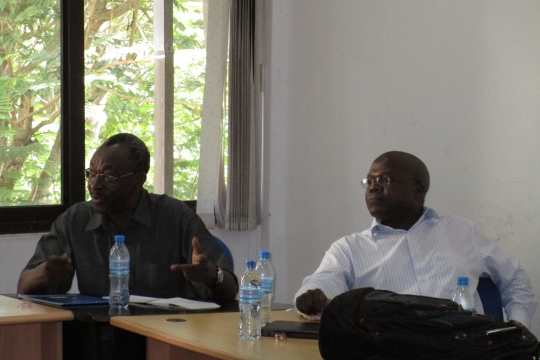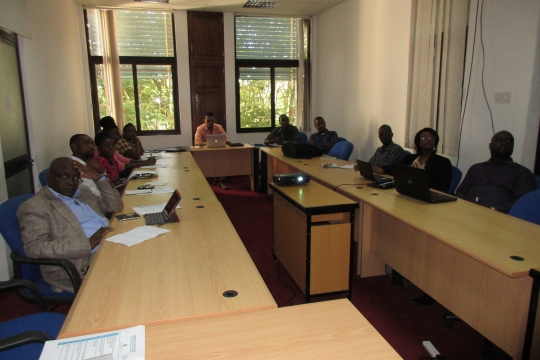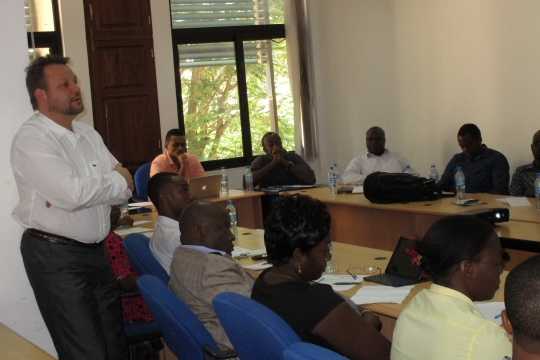A workshop for researchers and decision makers organized by the Environment for Development Initiative in Tanzania (EfDT) on 29th February, 2016 was of great interest and success. The aim of the workshop was to provide a platform for interaction with stakeholders by opening up discussions on research and policy issues in Tanzania.
This workshop attracted 30 participants from Government Ministries Department and Agencies as well as research centers. The aim of the workshop was to provide a great platform for interaction with stakeholders thereby opening up discussions on research and policy issues in Tanzania.
Mr. Onesmo Selejio presented report on Assessment of Impact of Sustainable land Management and Conservation Practices on Smallholder Agriculture in Tanzania: A Case Study of Bunda and Ileje Districts. Dr.Remidius Ruhinduka presented research paper on Credit, LPG Stove Adoption and Charcoal Consumption: Evidence from a Randomised Controlled Trial. Mr Gerald Kibira presented his recent findings on Park Pricing – Optimal price. And Dr. Byela Tibesigwa delivered retrospective findings on Using Behavioural Interventions to Improve Water Supply in Rural and Urban Tanzanian Households.
Dr. Byela Tibesigwa, EfDT Senior Research Fellow when asked to give her opinion on what aspect of the research meeting she considers being the most valuable. She had this to say, “The recent research meeting I attended in the EfDT centre offered an incredible platform for me as a researcher, and other researchers as well within EfDT, to directly interact with policy makers. We provided our research output and work in progress, and they in turn gave us feedback on the needs of policy makers in Tanzania, and how we as researchers can assist them in their policy making process.” She stated further that, “As I embark on my research projects in Tanzania, I am enthusiastic about all the opportunities that exist. More so that I will have a chance to work closely with policy makers, thereby make a direct difference to the people in Tanzania and achieve my objective of making a positive contribution towards the lives of people in sub-Saharan Africa that face many resource constraints.”
Likewise Dr. Ambrose Mugisha the delegate from UNDP Tanzania, when requested to give some feed back as his opinion of what discussions he considered to be the most valuable and the way forward. He said, “The EfDT research meeting was very interactive and informative; with insightful technological innovative ideas based on original and analytical research addressing contemporary development issues in the Tanzania. The meeting provided an avenue and impetus to upscale linkages, exchanges and experience sharing between researchers and policy decision markers; an important milestone in linking research to development. Many more such policy dialogues should be organized in the future especially at venues outside the University to motivate more policy, decision makers and the public members to attend.”
He further noted that, “From the workshop, it became clear that there is huge potential for EfDT to position itself as source of credible applied research findings to inform and shape policy and planning processes in the country. The EfDT research work will become even more relevant to the development context of Tanzania as the Country embarks on the implementation of the second Five Year Development Plan (FYDP II) aimed at propelling the country to the Middle Income Country (MIC) status by 2021 through industrialization. EfDT should hence aspire to add value to the government industrial transformation drive by positioning itself as the source of credible scientific evidence to help government to monitor and evaluate the impact of its plan on poverty reduction and human development. Further, EfDT could, and should, position itself to support Government to develop a Green Growth Strategy (GGS) to guide the industrial transformation efforts towards environmentally sustainable economic growth and poverty reduction.”
However, Dr. Mugisha concludes his opinion by saying that, “To meet this unique fit-for-purpose position; as dependable and trusted partner providing credible research information to inform and influence policy and planning process in the Country, EfDT must urgently develop a robust research agenda and strategy that will enable it to generate and disseminate scientific evidence; an important value addition to the body of knowledge and information needs in the country.”
It is know that sometimes it is terrifying trying to meet policy makers and famous people. But it is usually best to get an advisor or a colleague to introduce you to others. That means you'll learn a lot from talking about your work, seeing what challenges face people and receiving their ideas and suggestions, for example — but remember that no one likes to be in a conversation in which they only listen. You need to always tell people about your work, but also be sure to ask others about their work (even doing so first). You'll also learn a lot by listening and by asking questions. Keep an open mind, and try to deeply understand their research.
One of the PhD students who attended the workshop was asked. What do you think are the most interesting points from the research workshop? “Research workshop and seminars often act as a welcome source of motivation for those of us at the bench. Weeks, months or even years of banging our heads against a project can leave us wondering whether any projects ever actually work. However, sitting through talks at workshops, seminars or conferences proves that there is, in fact, hope. Further than hearing inspiring narrative stories, we see how others solved pertinent issues similar to ours, which may help us move past the barriers in our own research”. In her remarks she concluded that, “There’s also a tremendous opportunity to team up with some of the economic researchers whose work you have admired over the years. However, interaction and contacts may result in a new collaboration or even lead to a future carrier opportunity in the area of research. In addition, it’s always amusing to put the names you’ve read on papers for years with actual faces you meet at research meeting. Especially who has done a lot in your interest.”


